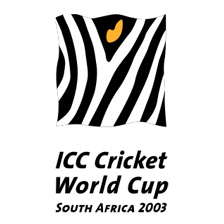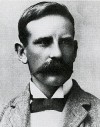A decade on from the Zimbabwe debacle
David Mutton |
The 2003 World Cup in South Africa was meant to be a transformational tournament. The ICC were determined, after riots in the semi-final of the 1996 World Cup and an English damp-squib in 1999, that this time they would produce a flawless showpiece, while the hosts looked forward to a joyous culmination of their journey from outcasts of the international game.
A decade after Ricky Ponting lifted the trophy it is easy to see that the problems which marred the tournament were hardwired into its structure. Everything about the World Cup was supersized, with fourteen teams plus huge television contracts and prize money. This created a bloated mess that lasted six weeks, which combined mismatched teams and killjoy laws targeted against ambush marketing to systematically squeeze the fun out of the competition.
The tournament could, perhaps, have survived even these problems but ironically the greatest crisis emerged not from any of the fifty-two matches but one that never took place.
In the spirit of pan-Africanism, South Africa shared their World Cup with Kenya and Zimbabwe, with the former slated for two games and the latter for six matches. Both proved problematic. New Zealand refused to play in Kenya after a bomb attack in Mombasa killed eleven people the previous year, and as a result forfeited the match, which helped Kenya to advance all the way to the semi-finals.
Zimbabwe’s role was the most controversial aspect of the World Cup. The country had recently been suspended from the Commonwealth after Robert Mugabe’s re-election for a third term in voting marred by violence, intimidation and disenfranchisement. The British press reported the crumbling economy in detail, which had been reportedly reduced to famine conditions, as well as botched land reform which had led to the violent eviction of many farmers and their workers, and a myriad of human rights abuses.
Although England had played a one-day international series in Zimbabwe eighteen months earlier the Commonwealth suspension led to renewed pressure to boycott their opening World Cup fixture, scheduled to be played in Harare. Peter Tatchell revived memories of his campaigns against apartheid South Africa with a “Stop the Tour” campaign and Peter Hain, another veteran of those struggles and by 2003 a cabinet minister, urged the England players to “show some moral backbone”.
While the consensus in England was that the match should not go ahead, the ICC insisted that a decision could be made only on grounds of safety. This separation of sports and politics was embedded into the organization’s culture; they insisted that they could not, and would not, make judgments on the political and human rights situations in their member nations. As such they would only let England out of the fixture if their government ordered them to do so. Prime Minister Tony Blair, while making it clear that he thought the match should not go ahead, claimed that “there are no legal powers available to the government to ban a sporting team from participation.”
The ECB were stuck, with neither the ICC nor the UK government budging. They had already signed a Participatory Nations Agreement in which they had agreed to send a full team to all their World Cup fixtures; breaking it risked fines up to £10 million which the UK government had already refused to pay.
A month before the World Cup Tim Lamb, the ECB’s chief executive had thrown in the towel. He announced that the board was unanimous in their decision that the match in Harare would go ahead, and they had all agreed that “the cancellation of one cricket match will not make the slightest bit of difference to the Mugabe regime or in any way lessen the economic and political turmoil in Zimbabwe.”
That would seem to be that. However on the other side of the world the England team were in the final stages of an exhausting and unsuccessful Ashes campaign. They had heard many of the voices campaigning against the fixture in Harare, and several of the players, especially Ashley Giles and Andrew Flintoff, expressed concerns about visiting the country. Not only were they worried about their own safety – the previous year a fan had reportedly been shot dead outside a ground after a one day international – but they had ethical qualms about the trip. After protracted discussions with the Professional Cricketers Association the England Squad requested that the ECB reconsider their decision on “moral, political and contractual” grounds.
Lamb and the ECB could not send the England team to Zimbabwe against their will, but also understood that the ICC would not tolerate a boycott of the match for moral or political reasons. With the ICC insistent and the ECB vacillating, the buck was passed to the team.
Despite their Ashes defeat, captain Nasser Hussein and coach Duncan Fletcher had forged an excellent working relationship and were taking the team on the slow journey that would end in the glorious summer of 2005. However Fletcher’s Zimbabwean heritage became a hindrance when his captain needed him most. Fletcher had played for his country in the years before they were elevated to test status, and had captained them in the 1983 World Cup. He feared that if the Zimbabwean government thought he supported a boycott they might target his wife’s family, who still lived in the country, or confiscate his passport if he ever visited in the future. Hussein, alone in the foreign world of cricket’s politics, told his charges that “some of you are going to have to take some serious growing up pills and take this issue very seriously.”
The World Cup Event Technical Committee had already denied England’s request to move the match once, and made it clear that the only escape clause was if it could be proved that the fixture would endanger the players. The South African organizers had left little to chance in this regard, with a hefty budget for security, thousands of police deployed to the events and detailed protocols for everything from riots to terrorism.
Then came a letter to the ECB from a group calling themselves ‘The Sons and Daughters of Zimbabwe.’ This anonymous missive threatened that if the match went ahead the players “would come home in coffins” and that their families would be in danger if they went through with the match.
The letter ignited anger from just about everyone. The relationship between the ECB and their players, already bruised, was stretched to breaking point when it came to light that Lamb had received the letter a fortnight earlier, while the ICC made it clear that they considered it an obvious fake. They pointed out that it had been posted in England, and that this was the first that anyone had ever heard of the organization. The head of the security team wrote to the ICC that “I am of the view that there is no reason why matches should not be played in Zimbabwe.”
With the World Cup about to start, the case rumbled on. In desperation Hussein found an unlikely but invaluable source of advice. On the eve of the opening ceremony Andy Flower and Henry Olonga were smuggled into England’s hotel and outlined their plan to wear black armbands during their first match against Holland. They talked about the reality of life in Zimbabwe and both counselled against England playing in their country.
There was now no question that the England team would not travel to Zimbabwe; the only matter to be settled was whether they would be penalised for their actions. The Event Technical Committee met to finally decide the matter on February 14, the day after the game was due to have taken place. In a meeting lasting six hours, the panel, which included such luminaries as Ali Bacher, Michael Holding, Sunil Gavaskar, and the ICC Chief Executive Malcolm Speed, considered the case. Eventually Speed announced that, although the “decision that gives the committee no pleasure” they had rejected all of England’s arguments and that the Sons and Daughters of Zimbabwe letter “did not constitute any credible threat to the safety and security of players and officials.” Zimbabwe would be awarded the match and receive the four points.
The World Cup limped on. The penalty turned out to be crucial as Zimbabwe progressed out of their group at the expense of England, although they went on to lose all their Super Six matches, including an embarrassing defeat to Kenya. It was very far from the transformative competition that the ICC originally envisioned but it did generate an enormous amount of money, with profits four times higher than the last World Cup. Despite the tedious nature of so many of the games the ICC focussed on their bottom line and applied the template to the subsequent tournament in the West Indies, which was if anything more tepid than its South Africa predecessor.
The ICC withheld $3.5 million from England’s share of revenue, which dented the ECB’s budget but was far from their worst fears. Hussein stood down from the one-day captaincy after England’s World Cup exit and the test captaincy during the subsequent series with South Africa. Speed, whose opinions on Zimbabwe’s status eventually led him to lose his ICC position, conceded that those who argued against the match “had a good argument” but that Hussein was “naive”. He almost certainly was, but in truth a captain was powerless with the full force of the game’s establishment arraigned against him.
Zimbabwe did not play test cricket between 2006 and 2011, but not because of political or even safety concerns, but that they were, simply, not good enough. They continued to receive full funding from the ICC, despite their lack of action and an external audit that accused Zimbabwe Cricket “serious financial irregularities”. Henry Olonga, who was forced to retire from international cricket and flee his homeland after his black armband protest, when reflecting on his actions, has said that “there is a world out there that is bigger than cricket.” The ICC has yet to find it.






Yeah, remember it well. I was torn for a while, but in the end I was pleased that we didn’t go to Zimbabwe, even though it ended up costing us a Super Six place. We should have beaten Australia of course.
Can 2003 be considered the first Internet world Cup? I would guess that not that many supporters were on line four years earlier. I just missed out, I didn’t get Internet access till later that year but I expect many of you had it. CW was in existence by then of course.
Comment by stumpski | 12:00am GMT 20 March 2013
I joined the forum in 2004 I think.. so I just missed it.
Comment by honestbharani | 12:00am GMT 20 March 2013
The first time that I can clearly remember using cricinfo to follow test cricket was during the 01/02 VB series, and that was because they had a link to the audio of the Channel 9 coverage (sadly didn’t last beyond that series), but I was definitely aware of its existence before that point – just didn’t use the internet that much.
Comment by Bahnz | 12:00am GMT 20 March 2013
Interestingly (well, sort of interestingly) I think Cricinfo covered the 1996 World Cup in some depth, with live scorecards and ball-by-ball commentaries. There can’t have been that many people online to follow it though.
Comment by davidmutton | 12:00am GMT 20 March 2013
2000 would’ve been the latest that I started looking up cricket online, because I can recall baggygreen.com.au being flogged on Channel 9 back then. In fact it was probably earlier as I recall visiting Cricinfo prior to then.
As for the 2003 world cup, Kenya making the semi finals was amusing to say the least.
Comment by Crazy Sam | 12:00am GMT 20 March 2013